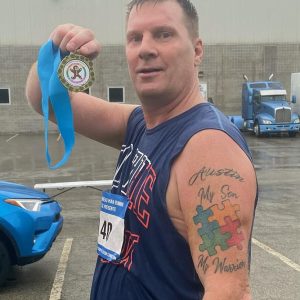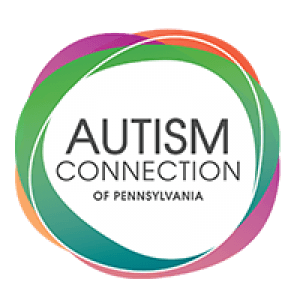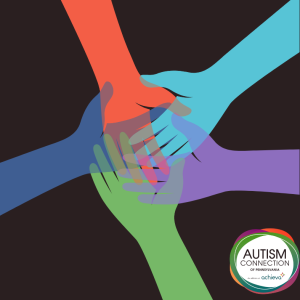We met up with some friends from the Gingerbread Man Running Company, who so generously donate proceeds from their annual half marathon to support you, the autism community in PA.
Distance events – the rolling, swimming, bike, or running kinds – and autism may have more in common than you might imagine. They require practice, repetition, a slow building of endurance and technique to accomplish things over time. Sometimes we fall, get a sprain, strain, become overheated or freezing cold. We can be out on a course when suddenly it starts lightning – and we need to tap into adrenaline and get to shelter as fast as possible. Sometimes we misjudge the depth of a puddle, catch a wave in our face, or slip on painted lines or ice we cannot see.

The race begins with Gingerbread Man’s support
Back to Labor Day 2022 – we turned out before dawn to see what we as volunteers needed to do, set up camp at the start/finish line, chatted up the Gingerbread Man himself along with his coworkers, and got ready to greet and cheer runners in their various distance races. At around 90 minutes in, we got ready to hand out medals to finishers, and counted how many people were left on the course when we were down to about ten. The bike guide finally rode up and let us know “there’s the party group and one person left.” We got the right number of water bottles and a medal ready to hand out to them. I wondered what “the party group” was – maybe some new kind of birthday tradition?
What we didn’t know is that the “party” was a group from Victory Multisport who came out to the race just to run the Half with the intent of supporting the last person running. They joined him along the way, and got to know his story. They just kept him going.
That’s it.
No major advice, no drama, no big deal was made, but by providing companionship, encouragement, and listening to his personal motivations and life experience, they got him over the finish line in fine form.

The Bike Guy
Lots of people live with disability and grind it out, one step or one roll at a time, like the half marathoner. They do this if they are the person disabled by society’s barriers, or if they are a loved one trying to help out, possibly with the majority of care responsibilities. Like a distance athlete, they may have coaches or observers yelling advice, saying things like “You Got This!” or “God knew what he was doing…” and other things which may or may not be helpful at times of worry, stress, or downright despair when we feel like quitting.
Distance athletes sometimes think “I can’t do this anymore – how can I slow down, pace myself, or just quietly stop – will anyone see me? Judge me? Will I judge myself? Am I a quitter?” Often, they just put mind over matter and make strides to move past that next pebble, landmark, or tree they see ahead. And they get where they are going, experiencing some success, often with pain or exhaustion as their main companions.
There’s nothing heroic about living a disability life. It is what it is – not a choice, not a game, not an action movie, but a fact of life. There are certainly no medals being handed out. If we are in more of a spectator role, how can we provide water, practical encouragement, and physical or emotional support to those who are grinding it out?
Using the distance athlete metaphor – some want to be left alone to focus, some look up and smile when there are cheers, everyone needs the water, and lots of people need nutrition without even realizing how low their resources have gotten.
The “party group” was super cool to show up and support a complete stranger. If you find yourself in a support role, think about the value of doing concrete things like dropping off a lasagna, or helping with yard, shopping, or household chores. The last runner stuck it out and finished with confidence and style, accepting the help that was offered and made it easier.

Successfully Determined Runner
If you have a disability, or are a caregiver with needs, are you able to accept support that’s offered and to be specific about telling people what you need? Maybe you have done this and been let down; maybe it worked and it got you closer to a goal you needed to reach. Or maybe, you helped someone else cross their own finish line when you reached out for help.













